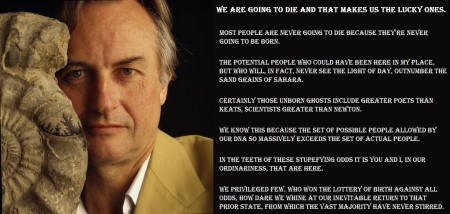Bioethics ends with Generosity, and the character nicknamed “Generosity.” Thassa constantly channels Richard Dawkins sans bluster or hubris (one reason why Powers and I love her): “we are the lucky ones,” he said.
And she says
Everyone alive should feel richly content, ridiculously ahead of the game, a million times luckier than the unborn
And
No one should be anything but dead.
And
Everything that is, is ours.
She’s right, of course; but of course like the rest of us she finally has a hard time holding those thoughts and holding off intermittent existential despair. Maybe none of us has alleles long enough to sustain our most elevated moments of transcendent insight. Alas. But maybe, too, their very transience and instability is what makes those moments so special.
Older Daughter amazed me by participating in NaNoWriMo, ”national novel-writing month,” a public writing project in which participants pounded out 50,000 words in thirty days. I was so impressed with her determination and stamina. I’d have felt more like Russell Stone, or a weak-willed Sisyphus, if you’d made me do that: “I have to go take my own life.”
All writing is re-rewriting. In the past that’s always slowed us down. If we’re re-writing not just words but genetic code, it may speed us up. Hang on.
As a pragmatist I feel somewhat dissed by Powers’ characterization of the ”witty pragmatism” of the positive psychologist who tells “Oona’s” audience– much like Oprah’s– about happiness. He might be right, though, to advise keeping your options open (“stay loose and keep revising the plan”). Is Powers right to predict that pop media culture will be the largest stage upon which our collective future is to be written? Scary thought. But “all the world’s a stage” is scary, too.
Kurton prefers collaborative fiction to singly-authored texts. He’s with techno-utopian Kevin Kelly, in the Updike-Kelly dispute. I’m still in Updike’s (not Kurton’s or Kelly’s) corner.
More Dawkins-esque rhapsodizing about our evolutionary epic:
Six hundred generations ago, we were scratching on the walls of caves. Now we’re sequencing genomes… If that doesn’t inspire us, we don’t deserve to survive ourselves.
That’s a bit harsh, but I’m inspired. I’m also partial to my old-fashioned founts of happiness. Can’t we have both?
Finally, in this oddly self-referential tale that ends in narrative dissolution, Powers asks “What kind of story would ever end with us?” For now our story simply continues with us. Where it all ends remains our most vital question. Unlike some reviewers [JWood... JMcInerney] (but like others), I love the postmodern ambiguous ending of Powers’ story. “She’s still alive, my invented friend, just as I conceived her, still uncrushed by the collective need for happier endings.” Thassa survives, battered by life but still generous and smiling at fate. We may still imagine her happy.
May we all borrow her generosity and cheer, give all we’ve got right now, and meet the future in due course. The Atlas goes dark every night, but so far it’s always turned back again to the light. Cue the symphony.
In A&P we finish with Christopher Hitchens' Mortality. Not a lot more needs saying, about the courage and grace of his unrepentant, unbowed exit from the only stage he knew just when he was "at the top of my form and just as things were beginning to plateau." It's just too bad we don't get to see what he'd have made of those last "fragmentary jottings."
How fitting that his last entry (borrowed from Einstein's Dream) repudiates immortality, in preference for the wholeness and freedom (and meaning) of finite life rounded with a sleep. What a testimonial to life's transient luster he left. Burning the candle of his life at both ends really did give a lovely light.
Life is of course the only stage any of us knows, much as some of us dream of an encore. Just watch Hitch's performance and learn. He was generous to the end. He gave all to his present, now our past and tomorrow's prologue. Our vital question remains: what will life make of itself, on this or other earths?
I don't think Hitch had an opportunity to read A.C. Grayling's The Good Book: A Humanist Bible, but I'll bet he'd have loved these concluding verses:
I don't think Hitch had an opportunity to read A.C. Grayling's The Good Book: A Humanist Bible, but I'll bet he'd have loved these concluding verses:
8. 'In our human world, in the short time we each have,
9. 'We see our duty to make and find something good for ourselves and our companions in the human predicament.'
10. Let us help one another, therefore; let us build the city together,
11. Where the best future might inhabit, and the true promise of humanity be realised at last.Amen!
Hitch's play is done. The play continues. Play on.

No comments:
Post a Comment